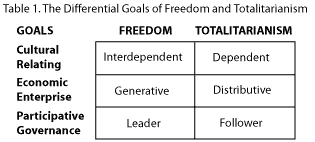Case Study Venezuela:
5. A Passion for Freedom
(Listen to the audio of this blog.)
Thanks for signing on. I’m Bob Carkhuff, and this is Freedomblog.com from our continuing series on “Case Study Venezuela.â€
The theme for today is A Passion for Freedom.
For thinking people, this means that the totalitarians are committed to leveling down everything and everyone.
We may view the individual goals of Freedom and Totalitarianism in sharp relief in Table 1 below:
- Interdependent versus Dependent Relating;
- Generative versus Distributive Economics;
- Leader versus Follower Participation.

At their highest levels, the Freedom Goals empower and free interdependent relating, wealth-generating participants with leadership qualities.
At their highest levels, the Totalitarian Goals control dependent-adaptive, wealth-redistributing followers of “chain-of-command†systems.
It is noteworthy that the highest levels of Totalitarian Performance are the lowest levels of Free Performance. And vice-versa! Which world do you choose?!
Right now, the Totalitarian Leadership holds the reigns of power. But, with no history of success anywhere—ever—and no investments to meet the changing conditions of the Global Marketplace, Totalitarian Venezuela has nowhere to go but down! At some point soon, the authors of this “Concrete Utopia†will be asked, “Where’s the money?â€
In transition, Free Venezuela sought to follow this model and become Latin America’s exemplary performer of the Freedom Functions. Unfortunately, she “got caught from behind†because:
- She moved too slowly!
- She moved too little!
- She was too satisfied!
In short, she lacked the vigilance that is “The Price of Freedom.â€
Finally, there is the story that Venezuelans often told about themselves good-naturedly:
When God created the world, He gave an abundance of resources to Venezuela.
When His helper asked, “Why?â€, he answered mischieviously:
Ah, but now I am going to populate it with Venezuelan people!
Perhaps many Venezuelans will no longer find the humor in this story.
Perhaps the Venezuelan people will never again see the humor in anything!
Perhaps Venezuelans may never feel passion again for anything, for if they cannot experience “a Passion for Freedom,†then they cannot experience passion at all!
Perhaps there is a message here for the citizens of the U.S.!
Signing off for Freedomblog, this is Bob Carkhuff.
Remember, We the People, if we do not have a passion for freedom, we cannot have a passion for anything. Think about it!
We invite your comments. Send to Bob at Freedomblog.com.
“May the road rise to meet you,
And the wind be at your back.â€

August 9th, 2007 at 2:29 pm
Dear Bob,
I have read your piece on descending into darkness Which
echos the learning and tragedy of venezuela.With the criteria you gave us we not only can judge America but our own organizations. We have lost our passion for freedom as a nation and our political parties operate out of privatized motives that reflect that they think our founding fathers meant them when they said “We the people.” I am sending the link for the freedomblog.com to “leaders” I know.
I guess we believe totalitarianism cant happen here. This is America. With that belief we never have to feel the urgency to act. THen when we think abouy action we say that it is impossible for one person to make a differenc. The problem is that the fascist believes time is urgent and their action will make a difference. Over time they get stronger and we fall further behind in defending our freedom. The story is always the same.The potentially good people sit on the sidelines with all sorts of thoughts all calculated to stop action.
I Think The Freedomblog is an opportunity to rekinle my passion for freedom and I am Hope ful it will rekindle the passion of pothers
August 14th, 2007 at 8:13 am
Dear Bob,
It seems that the achievement of goals has a hidden risk, complacency. When people are not “hungry”, not in a physical sense, but in a psychological sense, they become static. However, the “bad guys” are always “hungry” which means that the achievement of goals makes people vulnerable. Making it to middle class designation for one generation seems to become status quo for the next. I do not think that the middle class of any country has reflected on the strength and responsibility of their position in the structure of a country. And, they do not pass on to their offspring the need to reach back to bring others up, as a responsibility for their privilege. They do not understand the strength of the group is dependent on the weakest link in the chain.